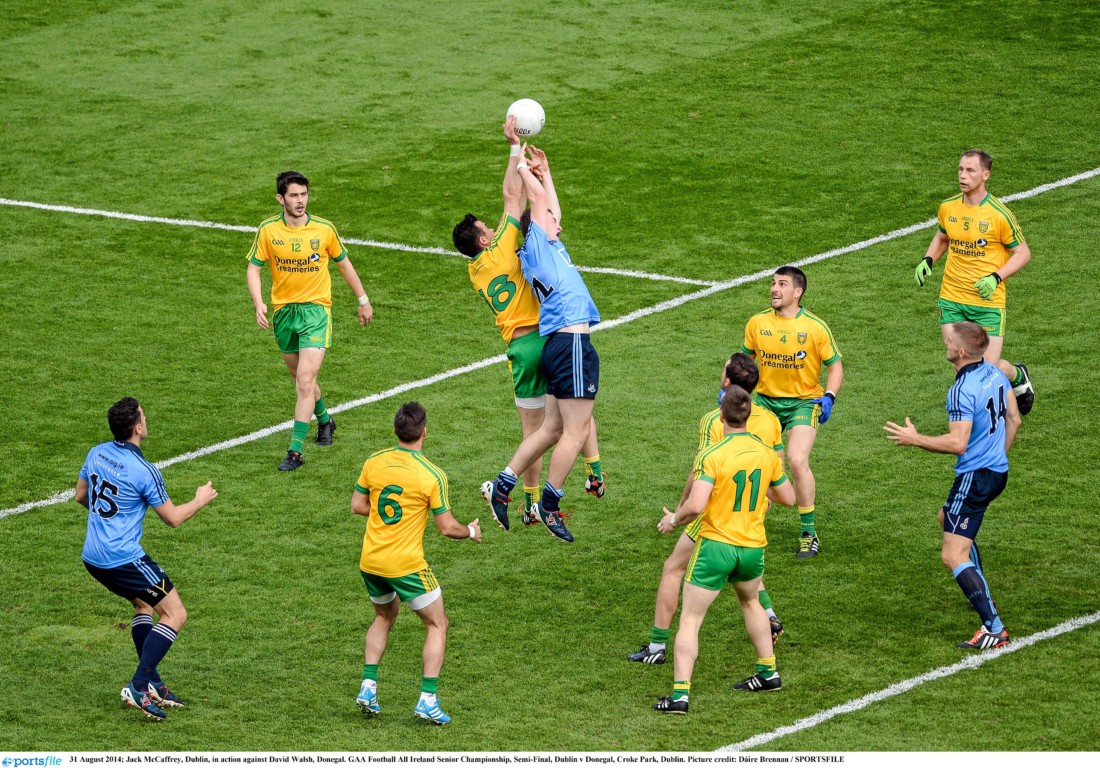IN 2014, Dublin had the best attack in Ireland and they were expected to steamroll their way into the final. Yet Donegal were waiting.
Donegal forward Dermot Molloy had been part of Jim McGuinness’s u-21 teams and came into the senior team under his Naomh Conaill clubmate.
Molloy didn’t play in the 2014 clash but he remembers the feeling about Dublin that year.
Molloy said: “Dublin were going that well, the attitude was that they were going to shoot the lights out.
“I remember hearing Paul Flynn say that 2014 was the best football that they played. But they didn’t win.”
The reason they didn’t win came down to Jim McGuinness’s tactics.
McGuinness had led Donegal to Ulster glory in 2011, beating Derry in the final in a season when they utilised a strict defensive system, which shut down opponents and made best use of the ball.
That strategy had been honed at u-21 level.
Kevin Mulhern was on the Donegal u-21 team that won the Ulster title in 2010. He remembers how McGuinness focused on simple skills in those days.
Kevin Mulhern said: “We knew that in training you did not go into contact. No joke we would be stopped anywhere from 20-50 times in training if you went into contact. The training was stopped and you would be told ‘that’s what I don’t want’, players going into contact.”
As well as not going into contact the players were encouraged to keep the ball moving.
“He said, ‘you keep the ball moving and no one is going to stop you or tackle you’.
“It was the first time that I had seen a clear structure coming into any kind of team.”
That clear structure would serve McGuinness’s teams well in 2011 when they won Ulster but it came to great importance in that game in 2014 when Donegal were able to stop the mighty Dublin from playing.
Odhran MacNiallais was part of the team that year and he recalls how the game plan worked.
“It was unbelievable. The first 20 minutes Dublin were all over us. Every time they attacked they were scoring. We felt like we needed half time to come. We got a foothold and tacked on scores. Then Ryan (McHugh) got the goal and that stunned Dublin. In the second half we got the goal, and then we got the third goal and then it hit us that we were going to win.
“I watched the game back and seeing things that Jim had told us were going to happen. It was unbelievable to think that he knew what was going to happen. The game-plan was perfection. You saw little things that people wouldn’t notice, that he had planned for.
“Jim and them must have watched hours of Dublin games and came up with a game-plan. It was a great game-plan but it needed to be executed. I get goosebumps watching it, and how he laid out the game-plan. It was pretty special. He was a special manager.”
The game-plan was focused on discipline, not taking the ball into the tackle, but also crucially if focused on how Dublin set up.
Dermot Molloy explained the key point.
“Jim had a plan. We had spent three hours of watching [Stephen] Cluxton’s kickouts. Those tactical sessions were intense. You wanted to go to bed after them.
“Dublin were playing sweepers and most teams were playing shite ball in and that suited Jonny Cooper and whoever else was playing in there, as they marked 10 yards in front. They looked like superstars. The plan that Jim was taking was that we would by-pass their press. Then we could win the ball but rather than kicking the ball in, we would run the ball and they couldn’t do anything about it because they had to either go for you or go for the next man.
“Their attacking football let them down a bagful that day.”
Donegal were underdogs in a game against a Dublin team regarded as having a devastating attack, but McGuinness’s team won 3-14 to 0-17, outplaying the Dubs in the second half.
They may not have won the final, but McGuinness proved that with the right game plan, and the right team, even the best attack can be defeated.
Receive quality journalism wherever you are, on any device. Keep up to date from the comfort of your own home with a digital subscription.
Any time | Any place | Anywhere












